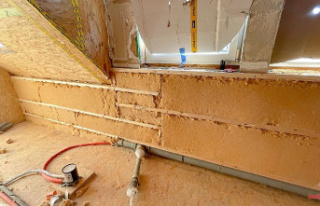The currently rising interest rates are making some homeowners break out in a sweat when it comes to follow-up financing. However, those who inform themselves in good time need not despair.
The sunny times for real estate buyers are over for now. While mortgage interest rates were between 1% and 2% or even less just a few months ago, they have been climbing rapidly since the beginning of this year. For some, this shatters the dream of owning their own home, but it also has a significant impact on all those home builders who now have to take care of their follow-up financing.
Because most construction financing is initially concluded with a fixed interest rate for ten or 15 years. If this period expires, renegotiations must be made and a follow-up loan agreed. Owners who are now faced with this task are exposed to great uncertainties.
"Nobody can say where the journey is going," says Annabel Oelmann, director of the Bremen consumer advice center. Has the tip of the iceberg been reached or will interest rates rise much further? It is therefore also difficult to give consumers general recommendations now.
"Every case is different, and every home builder should approach the matter individually," advises Jan Schulze, financing specialist at Dr. Klein Baufinanzierung, a nationwide financial service provider. "The first thing to do is to check the personal situation in the current phase of life and then replan the budget."
When it comes to follow-up financing, the financial situation of most people looks much better than it does shortly after the construction phase. Your earnings have increased in the meantime, perhaps inheritances and other income have been added.
"But of course there are also cases where things didn't go so smoothly and there was even a loss of income," says Oelmann. "In our consultations, we still see the effects of Corona, which restrict the family budget because there are no sideline activities or entire jobs have been eliminated." Added to this are the high energy prices, which put consumers under pressure.
The financing bank usually makes an offer for follow-up financing to its customer about three months before the end of the fixed interest period. "But that's far too late to deal with it for the first time," says Oelmann. Customers should keep a close eye on the market years in advance and obtain offers so that they have alternatives if they do not like the proposed conditions.
"Your own house bank often doesn't offer the best conditions," says Jan Schulze. "The interest rate differences between the bank offers are quite large, currently they are between 0.4 and 0.8 percentage points," said the expert. But you don't necessarily have to switch. Some house banks also accommodate their customers if they see that the offers from other banks are cheaper.
Many builders who have been paying off their loan for years want to stay with the amount they have paid so far when it comes to follow-up financing. "With the rise in interest rates, however, they no longer get the same for this amount," Jan Schulze points out.
In the low-interest phase, they were able to afford a comparatively high repayment, i.e. pay off the loan faster. Now they have to weigh up: Can I still afford the high repayment or do I have to cut corners and pay off longer because of the high interest rates?
"For many consumers, it is important that they create the conditions now to be able to finance their property safely through to the end," says Oelmann. "This clientele is interested in securing the current interest rates for as long as possible." Therefore, long-term contracts are often concluded.
Especially security-oriented customers can opt for a forward loan even before the fixed interest rate expires, with which the current interest rate level can be secured for up to five years in advance for a small surcharge. "It can be worth it, but in retrospect it can also be the wrong decision," says Jan Schulze.
On the other hand, there are also customers who are now initially relying on short-term contracts because they think things will change again. "No one can say today who will drive better in the end. It's a bet on the future," says Oelmann.
No matter which strategy the customer chooses in the end, there is an unreserved recommendation: "It is important to keep the repayment as flexible as possible," advises Klaus Kellhammer, head of the Tübingen regional office of the Association of Private Builders. "Customers should definitely agree on special repayments and repayment changes, even if it costs small surcharges." This is essential to remain able to act even in turbulent times.












